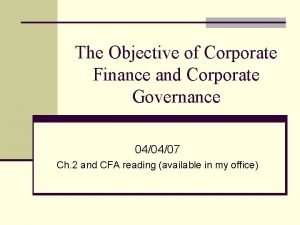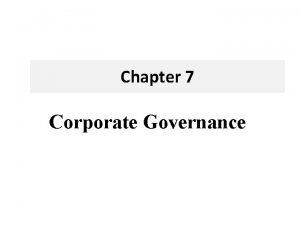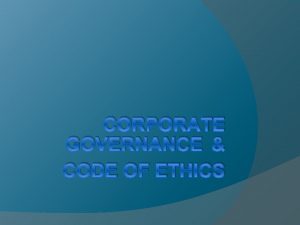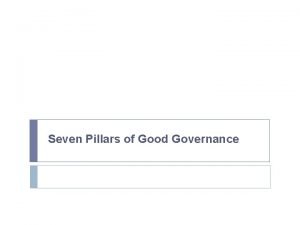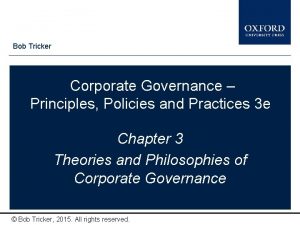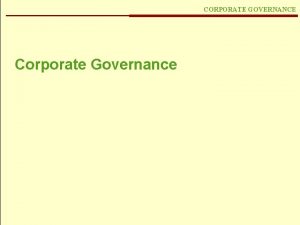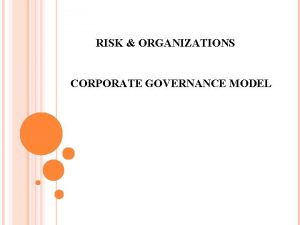CORPORATE GOVERNANCE IN CHINA BY ABDUR RASHID MIRZA

CORPORATE GOVERNANCE IN CHINA BY ABDUR RASHID MIRZA UNIVERSITY OF LAHORE Director of Research Centre Shanghai Stock Exchange

NEED OF CORPORATE GOVERNANCE IN CHINA The Chinese stock market was officially born in the 1990. It has grown to become the eighth largest in the world. Based on the statistics from late the China Securities (CSRC), there are Regulatory Commission already 70 million investor accounts opened across the country. Roughly 200 -300 million Chinese people, directly or indirectly, invest in and are also affected by the stock market. How to keep the investors’ overall enthusiasm about the stock market and strengthen their confidence in the market has always remained a heated debate in 2

GENERAL OBSERVATIONS ABOUT CORPORATE GOVERNANCE IN CHINA: • government influences management appointment and corporation operations; • too much power is concentrated in the hands of a few shareholders; and • at times, a lack of accountability for corporate actions or omissions. 3

BOARD ISSUES • Directors’ incentives may not be linked to their companies' return on equity or earnings per share growth. • Directors can not be dismissed (prior to the expiration of their term) without "cause, " although such concept is not defined. 4

BOARD ISSUES, CONT’D • Compared with practices in other markets, Chinese boards have less decisionmaking power within the existing legislative framework, while government ministries and commissions and securities regulatory authorities have substantial decision-making power. lack nominating committees for directors and corporate governance committees • Chinese corporations still and listed companies do not disclose their procedures for nominating directors or 5

INTRODUCING INDEPENDENT DIRECTORS • By June 30 th, 2002, at least 2 members of the boards of directors shall be independent directors; • Independent directors have the special power other than specified in the Company Law and other relevant laws and regulation: major related party transaction; the appointment or removal of the accounting firm; to call an interim shareholder’s meeting; to appoint the outside auditing; to solicit the proxies before the convening of the

THE ROLE OF BOARD OF DIRECTORS Corporate Strategy Committee Audit Committee Specialized Committees Nomination Committee Remuneration and Appraisal Committee

THE ROLE OF BOARD OF DIRECTORS ---SPECIALIZED COMMITTEES Composition • Chaired by an independent director • Independent directors constitute the majority • At least one independent director from the audit committee is an accounting professional

SHAREHOLDERS’ ISSUES • The Company Law requires every company to establish a shareholders' general meeting. • While every shareholder may attend a shareholders' general meeting. • Not all companies have established a shareholders' general meeting, and there are indications that some boards of directors simply ignore the meeting's decisions. • Shareholders' general meeting sometimes will vet proposed actions with the Board before taking action. 9

SHAREHOLDER PROTECTION ISSUES • Existing laws and regulations do not specify penalties for corporations and officers that obstruct shareholders’ rights to access information. • Securities Law is unclear as to whether investors can take civil action against directors and investment professionals for false or negligent disclosures that resulted in losses. 10

DISCLOSURE ISSUES • Financial reporting, accounting practices, and disclosure are oriented toward satisfying the information needs of taxation authorities. • Separate reporting for tax and accounting purposes does not exist. • Inadequate disclosure of related party transactions, line segment information, accounting policies, impact of extraordinary items, contingencies, capital commitments, and effects of changes in government policies. 11

TIGHTER REPORTING AND DISCLOSURE • Regular disclosure through audited annual report, mid-year report and un-audited quarterly report • Listed companies are required to include in their annual reports a narrative statement of how they apply the Code of corporate governance to their particular circumstances.

CHINESE CENTER FOR CORPORATE GOVERNANCE(CCCG) • Functions of CCCG: organizing information exchange forums; conducting research projects; organizing training program; providing policy consulting service; building an international network with our counterpart worldwide.

NEED MORE CHANGES IN THE FOLLOWING AREAS • Proper legal mechanism in the legislation, enforcement, and jurisdiction for supporting corporate governance Civil compensation in Securities Law violation: Legal basis for action by investors against law violator on stock market: The Securities Law; The Companies Law.

NEED MORE CHANGES IN THE FOLLOWING AREAS • Intermediaries need governance too. By this I mean investment funds and brokerage houses. We have found there are issues in some of the smaller firms that find themselves in financial trouble, particularly in times of market downfall. You find it is because they did not have good risk management or internal control,

NEED MORE CHANGES IN THE FOLLOWING AREAS • A culture of awareness about the importance of corporate governance. China is still in its initial stage in term of corporate governance. It is a big task in China to increase the awareness of the importance of corporate governance. But we must take the first step through education, setting up Codes & rules

THE CHALLENGE OF CORPORATE GOVERNANCE REFORMS IS SYSTEMIC • Corporate governance rests on three basic disciplines: market discipline, regulatory discipline and selfdiscipline • Establishing sound legal institutions is an issue of paramount importance in ensuring the proper conduct of directors in China. • The biggest challenge in improving corporate governance in China is the extensive involvement of

THE CURRENT WAVE OF GLOBALIZATION IS CREATING VERY FLUID COMPETITIVE ENVIRONMENT • No nations and companies can formulate strategies in isolation or ignorance of global business and best practices. • Corporate governance essentially provides rules, frameworks and incentives to help us make correct choice • It will end up with our personal values of integrity and

THANK YOU
- Slides: 19
